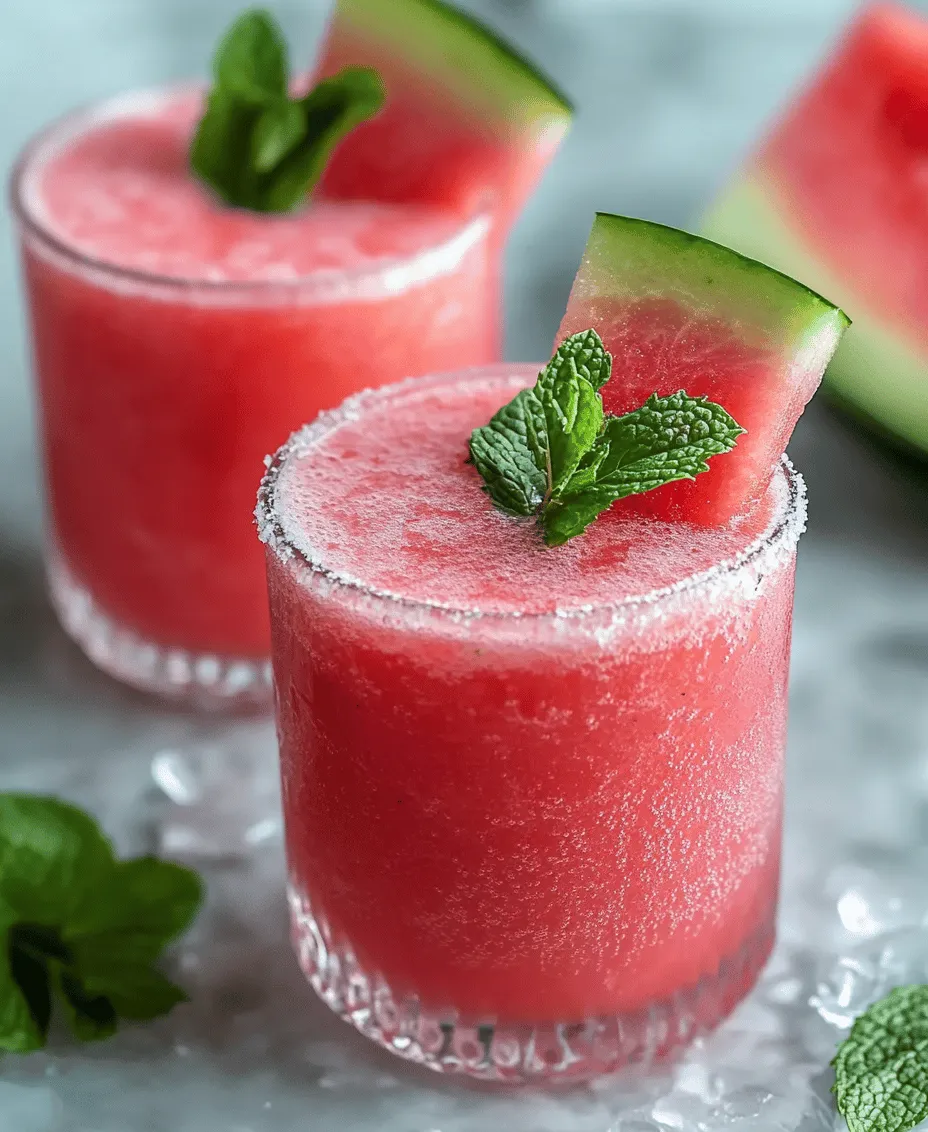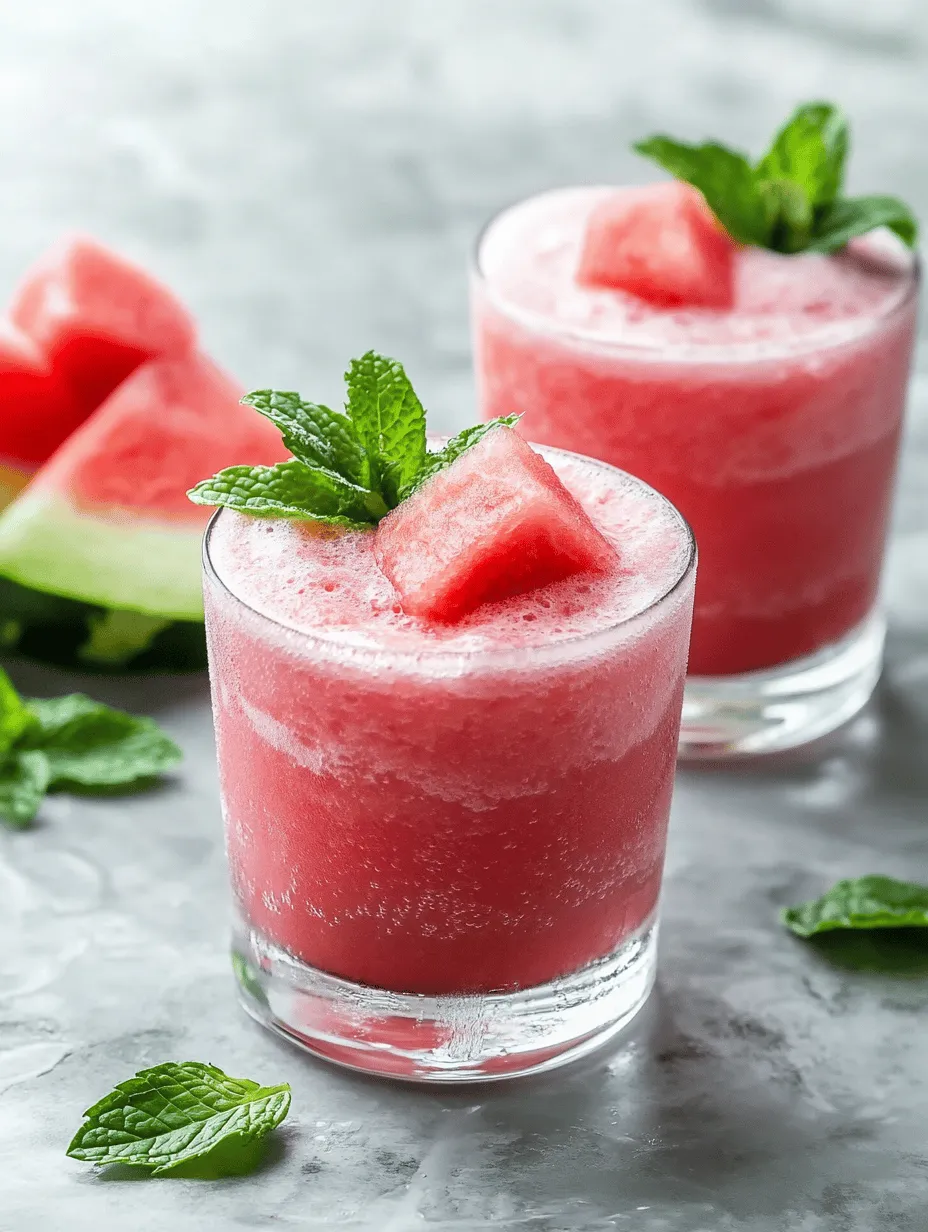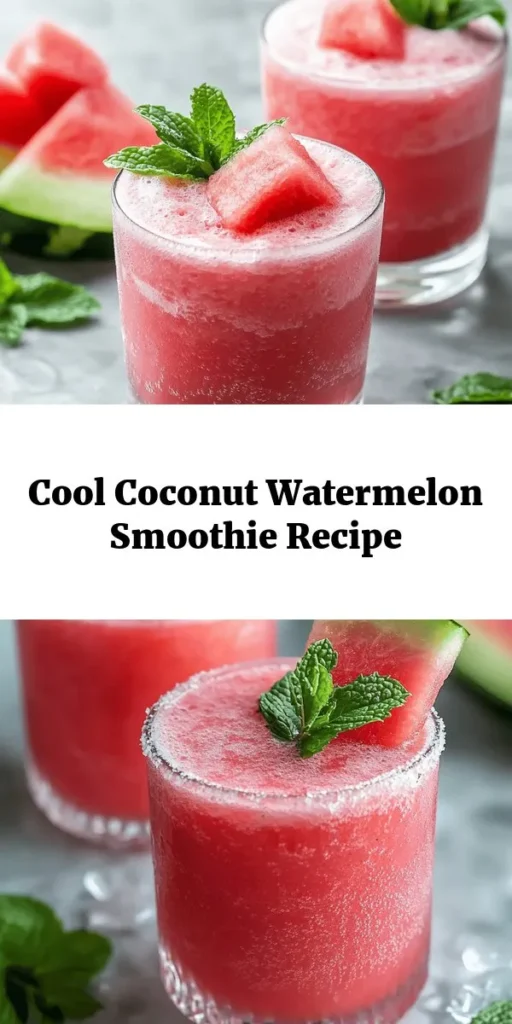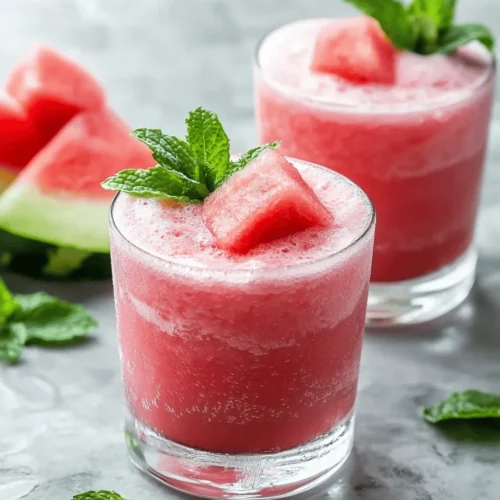Introduction
In recent years, smoothies have surged in popularity, becoming a staple in the diets of health-conscious individuals and casual snackers alike. Easy to make, versatile, and packed with nutrients, smoothies offer a convenient way to enjoy a variety of flavors and health benefits in a single glass. Among the myriad of smoothie recipes available, the Refreshing Watermelon Smoothie with Coconut Water stands out, especially as the sweltering summer months approach. This vibrant drink not only quenches your thirst but also provides a delightful blend of sweetness and tropical flair that makes it a perfect companion for sunny days.
The combination of watermelon and coconut water in this smoothie brings together two of summer’s most hydrating ingredients. Watermelon, known for its high water content, is both refreshing and revitalizing, while coconut water adds a natural sweetness that complements the watermelon beautifully. This duo not only makes for a delicious beverage but also offers a host of nutritional benefits that can help keep you energized and hydrated throughout the day.
The Appeal of Watermelon in Summer
Watermelon is the quintessential summer fruit, celebrated for its juicy, sweet flesh and vibrant red color. With an impressive water content of about 92%, watermelon is nature’s answer to hydration, making it an ideal choice during the hot summer months when staying hydrated is crucial. Beyond its refreshing taste, watermelon is rich in essential vitamins and antioxidants, such as vitamins A and C, which play a significant role in supporting skin health and boosting the immune system.
Moreover, watermelon contains lycopene, a powerful antioxidant that gives the fruit its distinctive pink hue. Lycopene has been studied for its potential health benefits, including its ability to combat free radicals and reduce the risk of chronic diseases. The versatility of watermelon also extends to culinary traditions around the world. From refreshing salads to savory salsas, this fruit has been enjoyed in various forms across different cultures, symbolizing summer and abundance.
In addition to its flavor and nutritional profile, watermelon has a cultural significance in many regions. In parts of Africa, it is often used in celebrations and rituals, while in Asian cuisines, it is incorporated into dishes that highlight its sweet and savory contrasts. Whether enjoyed on its own or blended into a smoothie, watermelon continues to hold a special place in the hearts (and stomachs) of many.
Coconut Water: Nature’s Hydration
Coconut water, often referred to as “nature’s sports drink,” is the clear liquid found inside young coconuts. This refreshing beverage is not only hydrating but also packed with essential electrolytes, making it an excellent choice for rehydration after physical activity. The harvesting of coconut water involves carefully cracking open young green coconuts, which are often chosen for their optimal water content. Fresh coconut water is low in calories, fat-free, and contains a variety of beneficial nutrients, including potassium, sodium, and magnesium.
The nutritional profile of coconut water is particularly appealing for those looking for a natural alternative to sugary sports drinks. It provides a quick source of hydration and replenishes electrolytes lost during exercise or exposure to heat. Studies have shown that coconut water can help support digestion, thanks to its natural enzymes, and may even aid in reducing blood pressure due to its potassium content.
Incorporating coconut water into your diet can be an enjoyable way to enhance your hydration strategy, especially in the summer when the body demands more fluids. When paired with watermelon in a smoothie, coconut water not only adds flavor but also enhances the overall nutritional value of the drink, making it a wholesome choice for those seeking refreshment and nourishment.
Ingredients Breakdown
Now that we have explored the appeal of watermelon and the benefits of coconut water, let’s dive into the ingredients that make this smoothie not only delicious but also nutrient-rich.
Watermelon
When selecting watermelon for your smoothie, look for a fruit that is ripe, heavy for its size, and has a uniform shape without blemishes. Seedless varieties are particularly convenient for smoothies, as they provide a smooth texture without the interruption of seeds. The best watermelons have a deep green rind and a creamy yellow spot on one side, indicating ripeness. When blended, the natural sweetness of ripe watermelon shines through, providing a refreshing base for your smoothie.
Beyond its hydrating properties, watermelon is low in calories and high in vitamins, making it an excellent addition to any health-conscious smoothie. It is also packed with citrulline, an amino acid that may help improve blood flow and reduce muscle soreness after exercise. This makes watermelon an ideal post-workout refreshment, especially when blended into a smoothie.
Coconut Water
Coconut water can be found in both packaged and fresh forms. While fresh coconut water is often considered the gold standard for its pure taste and nutritional value, packaged coconut water can be a convenient option for everyday use. When choosing packaged coconut water, look for options that are labeled as “100% coconut water” without added sugars or preservatives.
The flavor of coconut water is slightly sweet with a hint of nuttiness, which complements the natural sweetness of watermelon perfectly. It’s important to note that the taste can vary depending on the brand and whether it is pasteurized or not. For the most authentic experience, using fresh coconut water will enhance the overall flavor of your smoothie and provide the best nutritional benefits.
Frozen Banana
Adding a frozen banana to your watermelon smoothie not only enhances the creamy texture but also contributes natural sweetness. Bananas are an excellent source of potassium, which works in tandem with the electrolytes found in coconut water to further support hydration. When using frozen bananas, simply peel and slice them before freezing to ensure they blend easily into the smoothie.
Frozen bananas also allow you to create a chilled smoothie without the need for ice, which can dilute the flavor. This technique helps maintain the integrity of the watermelon and coconut water, resulting in a smoother and more enjoyable drinking experience.
Fresh Lime Juice
To balance the sweetness of the watermelon and banana, a splash of fresh lime juice is essential. Lime juice adds a zesty acidity that elevates the overall flavor profile of the smoothie, creating a refreshing and vibrant drink. Additionally, lime is rich in vitamin C and antioxidants, further enhancing the nutritional benefits of your smoothie.
Using fresh lime juice instead of bottled juice is recommended, as it has a brighter flavor and retains more nutrients. Simply roll the lime on your countertop before slicing it open to release more juice, ensuring that you get the most flavor out of each squeeze.
By carefully selecting and preparing these ingredients, you will create a Refreshing Watermelon Smoothie with Coconut Water that is not only delicious but also packed with health benefits. The combination of hydrating watermelon, nutrient-rich coconut water, creamy frozen banana, and zesty lime juice makes this smoothie a must-try for anyone looking to enjoy a cool and nutritious treat during the summer months.




